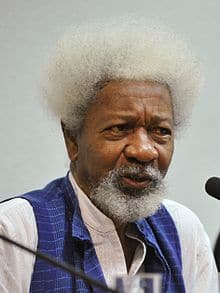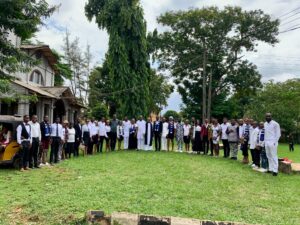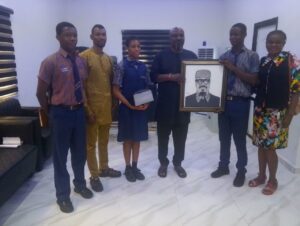Soyinka backs Obasanjo on Boko Haram’s comment

Wole Soyinka
Former President Olusegun Obasanjo has received support from an unlikely quarter: the Nobel laureate, Professor Wole Soyinka; over his recent comments imputing ethno-religious motive to Boko Haram and Islamic State’s West Africa Province.

Nobel Laureate Wole Soyinka has asked the Federal Government not to ignore former President Olusegun Obasanjo’s assertion that activities of Boko Haram and herdsmen in Nigeria are now West African Fulanisation and Islamisation agenda.
Speaking at an event in Lagos organised by the United Bank for Africa (UBA) to commemorate this year’s Africa Day in Lagos yesterday, Soyinka stated that although he frequently criticizes Obasanjo, the former President was largely accurate in his recent description of the current state of affairs in the nation. According to him, people who have criticised Obasanjo over the comments were focusing on the messenger and not the message.
He stated that having read the former President’s comments, he could not fault his description about the challenges the country is currently facing, especially given the spate of kidnapping and banditry in the land. He said:
“This country is descending into a horrendous abyss, the like of which have not been witnessed in this country.” The Nobel laureate said he read the Minister of Information and Culture, Alhaji Lai Mohammed’s response to Obasanjo’s comments and noticed that the minister was focusing largely on the language used by the former President and not the substance of what he said.
“We should not be too abrasive in our assessment of Obasanjo’s comment, but we should analyse it and focus on the substance,” Soyinka stated. Soyinka, who stated that he supports the need for African unity, however, noted that leaders must not make the mistake of ignoring issues that cause disunity because unity cannot be commanded into existence.
“I believe our unity is possible even with the plethora of languages,” he said.
“We just have to understand what the purpose of that unity is. Priorities exist, but the picture of Africa together is one we must keep in view, but not forget the issues militating against it.
“I wish to plead that we particularize the sense of unity. Let’s prioritize the material condition of our people. Right now, we are being recolonized by some internal forces.”
The programme, which had as its theme: “Africa’s History Redefined: Our past, a path to the future,” had other panelists like Prof. Djibril Tamsir Niane, a Guinea historian; the daughter of Ghana’s first President Kwame Nkruma, Samia Nkrumah, who is also a leading female politician; UBA Chairman, Tony Elumelu, and Femi Kuti, Afrobeat musician and activist.
The Noble laureate criticised those behind the de-listing of History from Nigerian schools’ curriculum. He stated that those who took that decision deserved to be “expunged from history.”
As he put it: “History is a burden and that is why most people avoid it. Sometime ago in Nigeria, a minister deemed it fit that History be removed from the syllabus, I was shocked. Those who expunged such a discipline from our schools deserve to be expunged from history altogether.”
It would be recalled that History, as a standalone subject, was missing from the basic and junior secondary schools’ curriculum in the country until it was reintroduced in the 2018/2019 curriculum.
In his remarks, Elumelu said it is time for Africa to move on from blaming others for its woes. He stated that while History was an important subject that should be taught in schools, children should also be taught the history of economic development in Africa.
“We need to move on from blaming others for our history and drop our entitlement mentality. We can’t keep telling our children this history. Let us tell a history of our economic renaissance and development.
I see a continent with all the potentials to be great. We need to move to the future with optimism leveraging on the resources we have; a population we can retrain. “As we talk about our history, we need to think of the type of history our children will tell,” he added.






